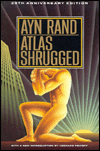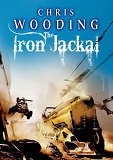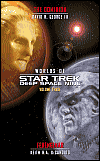
Atlas Shrugged, by Ayn Rand
Book Review by Lisa Binkley
Have you read this book?
I am a voracious reader of all kinds of fiction. I usually have at least three books in progress at any given time. Even with the advent of my newest obsessive passion of writing I still manage to read a book or two a week. Which brings me to the novel I just finished.
Way back in October, I visited my 'baby' sister in Phoenix. The weather was less than perfect - since when does it rain in Arizona? - so I had time to read. This book was lying on an end table and, when I gave it a curious once-over, Jill said, "Oh! You gotta read that one!" Well. I have to admit that it wasn't an easy read. The type was tiny, the format was odd (no paragraph breaks between dialogue, lots of ellipses and em-dashes), and the secondary characters annoyed the crap out of me. About 150 pages in (and two months of reading a few pages and setting it aside) something happened in the plot that set me on fire. I began reading as if I had a deadline (I did, Jill wanted the book back by Christmas - oops).
Have you ever read something that, though it may not change your life, defines some nebulous principle - one that you've long held to be true but could never find the words to describe? In this novel, the author expounds on them, exploring the faulty reasoning behind the 'welfare state', about the importance of not abdicating personal responsibility, and the fallacy of thinking that wanting a thing to be true is the same as a thing being true.
The story is set in the past few decades of an alternate history. The major characters are wealthy industrialists who succeed by dint of their own worth. The world has become a crumbling morass of People's Nations and the United States has stumbled onto the same path to destruction. The premise of these leeches is that it isn't fair for the talented and capable to succeed while the mediocre and inept fail. Therefore the successful must be immoral in their methods and it is the government's responsibility to control the profits these movers and shakers can reap by redistributing the wealth by coercion, threat, and force. The 'people's movement' by sheer weight of numbers forced the productive elements - successful businesses, creative and innovative companies, reliable suppliers and manufacturers - to provide greater and greater sacrifices (such as levies, taxes, and forced hiring of useless and unneeded workers) to support others for 'the good of the people' until the whole house of cards came tumbling down when the 'minds' went on strike and left the 'bodies' to fend for themselves.
The scary thing is how easy I found the parallel between the author's world and our own. Do we not do this very thing? Will not the result mirror her conclusions? Are we not creating a society in which our wishes are tantamount and our responsibilities forgotten? When we excuse antisocial behavior because of a 'bad home life' or poverty, aren't we setting the stage for further corruption? Haven't we begun a campaign of penalizing success and rewarding mediocrity? If you disagree visit a public school. So much of the curriculum is geared to the slowest and has no allowances for the bright to excel because that sort of competition might hurt someone's feelings. We are teaching our children that wanting to do well should be the same as actually doing a good job. How can we expect people to achieve, to rise and innovate, to strive to create new technologies and processes, if we then castigate and malign their efforts and let the profit of the power of the mind be looted by those who merely want but are not willing or able to achieve? Although we are, or should be, considered equal in the eyes of justice, we are far from equal in abilities, intelligence, and talent. (Yes, Mom, the world needs ditch-diggers too, but I, for one, don't want one doing my heart surgery.)
I am me and will strive to continually test my innate boundaries and redefine that of which I am capable - but not by infringing on the boundaries of others. My rights end where his begin - and vice-versa. I'd like to be rich but I never will be. I do not blame the wealthy, gifted, or successful for my failure. I simply don't have the talent, determination, and will power to be a Bill Gates or an Anne Rice or a Tiger Woods. I do know our world will be a poorer one if the stars are tarnished and prevented from shining - depriving those rare few, born capable of greatness, of an example to follow a similar but very personal road to Olympus.
I cannot be an Olympian but, please, let us allow them to exist. I fear for our own existence if they do not.
Way back in October, I visited my 'baby' sister in Phoenix. The weather was less than perfect - since when does it rain in Arizona? - so I had time to read. This book was lying on an end table and, when I gave it a curious once-over, Jill said, "Oh! You gotta read that one!" Well. I have to admit that it wasn't an easy read. The type was tiny, the format was odd (no paragraph breaks between dialogue, lots of ellipses and em-dashes), and the secondary characters annoyed the crap out of me. About 150 pages in (and two months of reading a few pages and setting it aside) something happened in the plot that set me on fire. I began reading as if I had a deadline (I did, Jill wanted the book back by Christmas - oops).
Have you ever read something that, though it may not change your life, defines some nebulous principle - one that you've long held to be true but could never find the words to describe? In this novel, the author expounds on them, exploring the faulty reasoning behind the 'welfare state', about the importance of not abdicating personal responsibility, and the fallacy of thinking that wanting a thing to be true is the same as a thing being true.
The story is set in the past few decades of an alternate history. The major characters are wealthy industrialists who succeed by dint of their own worth. The world has become a crumbling morass of People's Nations and the United States has stumbled onto the same path to destruction. The premise of these leeches is that it isn't fair for the talented and capable to succeed while the mediocre and inept fail. Therefore the successful must be immoral in their methods and it is the government's responsibility to control the profits these movers and shakers can reap by redistributing the wealth by coercion, threat, and force. The 'people's movement' by sheer weight of numbers forced the productive elements - successful businesses, creative and innovative companies, reliable suppliers and manufacturers - to provide greater and greater sacrifices (such as levies, taxes, and forced hiring of useless and unneeded workers) to support others for 'the good of the people' until the whole house of cards came tumbling down when the 'minds' went on strike and left the 'bodies' to fend for themselves.
The scary thing is how easy I found the parallel between the author's world and our own. Do we not do this very thing? Will not the result mirror her conclusions? Are we not creating a society in which our wishes are tantamount and our responsibilities forgotten? When we excuse antisocial behavior because of a 'bad home life' or poverty, aren't we setting the stage for further corruption? Haven't we begun a campaign of penalizing success and rewarding mediocrity? If you disagree visit a public school. So much of the curriculum is geared to the slowest and has no allowances for the bright to excel because that sort of competition might hurt someone's feelings. We are teaching our children that wanting to do well should be the same as actually doing a good job. How can we expect people to achieve, to rise and innovate, to strive to create new technologies and processes, if we then castigate and malign their efforts and let the profit of the power of the mind be looted by those who merely want but are not willing or able to achieve? Although we are, or should be, considered equal in the eyes of justice, we are far from equal in abilities, intelligence, and talent. (Yes, Mom, the world needs ditch-diggers too, but I, for one, don't want one doing my heart surgery.)
I am me and will strive to continually test my innate boundaries and redefine that of which I am capable - but not by infringing on the boundaries of others. My rights end where his begin - and vice-versa. I'd like to be rich but I never will be. I do not blame the wealthy, gifted, or successful for my failure. I simply don't have the talent, determination, and will power to be a Bill Gates or an Anne Rice or a Tiger Woods. I do know our world will be a poorer one if the stars are tarnished and prevented from shining - depriving those rare few, born capable of greatness, of an example to follow a similar but very personal road to Olympus.
I cannot be an Olympian but, please, let us allow them to exist. I fear for our own existence if they do not.
|
Click here to buy Atlas Shrugged, by Ayn Rand on Amazon
|
Atlas Shrugged, by Ayn Rand on Amazon

| More Books You Might Like |
Comment on Atlas Shrugged, by Ayn Rand


